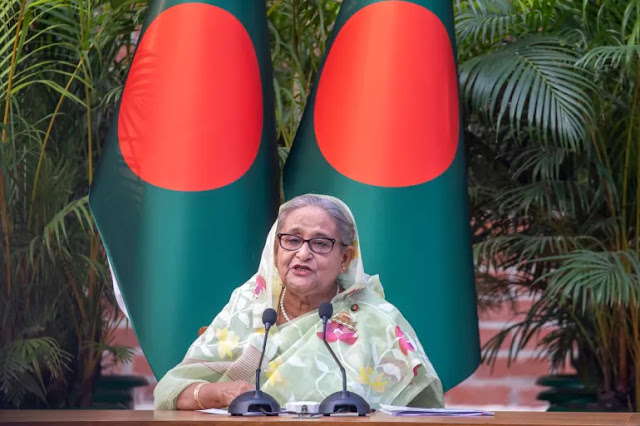Bangladesh PM Sheikh Hasina's Removal from Power: A Comprehensive Analysis
Introduction
Sheikh Hasina, the Prime Minister of Bangladesh, has been a central figure in the country’s political landscape for decades. Her tenure has seen significant economic growth, infrastructural development, and social progress. However, her leadership has also been marred by controversies, allegations of corruption, and accusations of human rights violations. This article aims to provide a comprehensive analysis of the factors leading to Sheikh Hasina's removal from power, examining the historical context, political dynamics, and international influences that have shaped this pivotal moment in Bangladesh's history.
Historical Context of Sheikh Hasina's Leadership
Sheikh Hasina's political journey began with her involvement in the Awami League, a party founded by her father, Sheikh Mujibur Rahman, the founding leader of Bangladesh. Over the years, she rose to prominence, eventually becoming the Prime Minister in 1996. Her tenure has been marked by numerous achievements, including significant economic reforms, improved infrastructure, and efforts to reduce poverty. However, her leadership has also faced significant challenges, including political unrest, corruption allegations, and human rights issues.
Factors Leading to Political Discontent
Economic Challenges Despite notable economic growth, Bangladesh has faced several economic challenges under Sheikh Hasina's leadership. Rising inflation, increased cost of living, and unemployment have contributed to public dissatisfaction. Many citizens feel the benefits of economic growth have not been equitably distributed, leading to widespread discontent.
Corruption Allegations Sheikh Hasina's government has been plagued by numerous corruption scandals. High-profile cases involving government officials and businessmen have eroded public trust in her administration. Despite efforts to address these issues, the perception of widespread corruption has significantly impacted her political standing.
Human Rights and Freedom of Speech Under Sheikh Hasina's rule, there have been numerous reports of human rights violations, including crackdowns on dissent, suppression of free speech, and political imprisonment. These actions have drawn criticism from international human rights organizations and have fueled domestic opposition, further weakening her position.
Political Opposition and Movements
Opposition Parties The main opposition to Sheikh Hasina's government has come from the Bangladesh Nationalist Party (BNP) and the Jatiya Party, among others. These parties have capitalized on public discontent, rallying support through promises of change and accountability.
Key Opposition Leaders Leaders such as Khaleda Zia of the BNP have played a crucial role in mobilizing anti-government sentiments. Their political agendas resonate with many citizens who are frustrated with the current administration's perceived failures.
Public Protests and Movements Bangladesh has witnessed significant public protests and movements demanding political change. Social media and digital activism have played a crucial role in organizing and amplifying these protests, particularly among the youth and civil society groups.
International Influence and Relations
Role of Neighboring Countries Bangladesh's political landscape is significantly influenced by its neighbors, particularly India and Pakistan. India's diplomatic and economic ties with Bangladesh have a profound impact on its internal politics, while Pakistan's historical and cultural connections also play a role.
Global Powers' Influence Global powers such as the US and China have vested interests in Bangladesh. The US has been vocal about human rights concerns, while China has invested heavily in the country's infrastructure, influencing its political dynamics.
International Organizations' Stance International organizations, including the United Nations and various human rights groups, have criticized Sheikh Hasina's government for human rights violations. Economic institutions like the IMF and World Bank have also weighed in on the country's economic policies.
Legal and Constitutional Aspects
Bangladesh's constitution provides specific provisions for the removal of a Prime Minister. Legal challenges and court rulings have played a significant role in the political transition, with the judiciary acting as a crucial arbiter in the process.
The Path to Removal: Key Events
A series of significant events led to Sheikh Hasina's removal from power. Public protests, political negotiations, and the involvement of the military and security forces were pivotal in this process. The timeline of these events highlights the complexity and intensity of the political struggle.
Aftermath and Future Prospects
The immediate aftermath of Sheikh Hasina's removal has created a power vacuum and uncertainty. Potential successors and transitional government arrangements are being closely watched. The long-term implications for Bangladesh's democracy will depend on how the country navigates this critical period.
Conclusion
Sheikh Hasina's removal from power marks a significant chapter in Bangladesh's political history. While her tenure saw notable achievements, it was also fraught with challenges that ultimately led to her downfall. This analysis underscores the importance of democratic processes and the need for continued vigilance in upholding human rights and good governance. As Bangladesh moves forward, the lessons from this period will be crucial in shaping its future political landscape.
FAQs
What were the main achievements of Sheikh Hasina's tenure?
- Economic growth, infrastructure development, and poverty reduction.
What led to the public dissatisfaction with Sheikh Hasina's government?
- Economic challenges, corruption allegations, and human rights issues.
Who are the main opposition leaders in Bangladesh?
- Khaleda Zia and leaders from the BNP and Jatiya Party.
How have international organizations reacted to Sheikh Hasina's leadership?
- They have criticized human rights violations and economic policies.
What are the potential future prospects for Bangladesh's political landscape?
- The future will depend on the transitional government's ability to uphold democracy and address public concerns.



